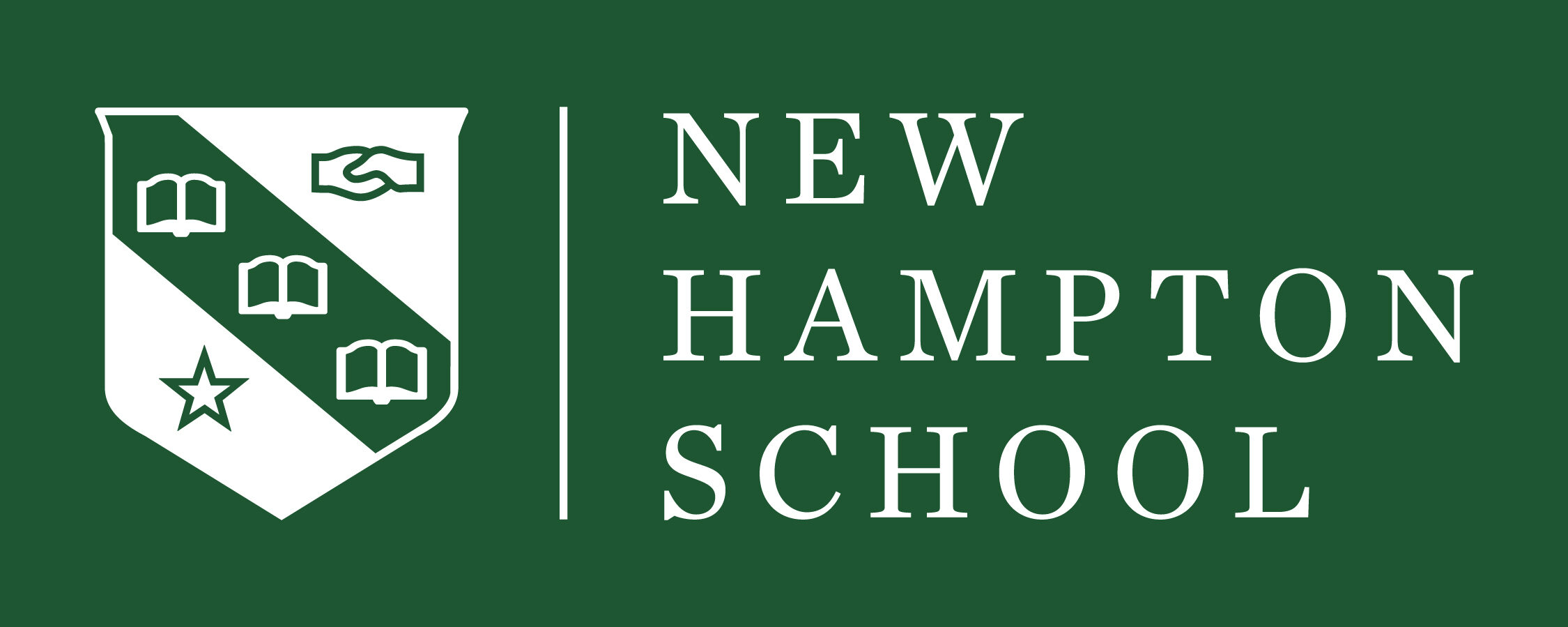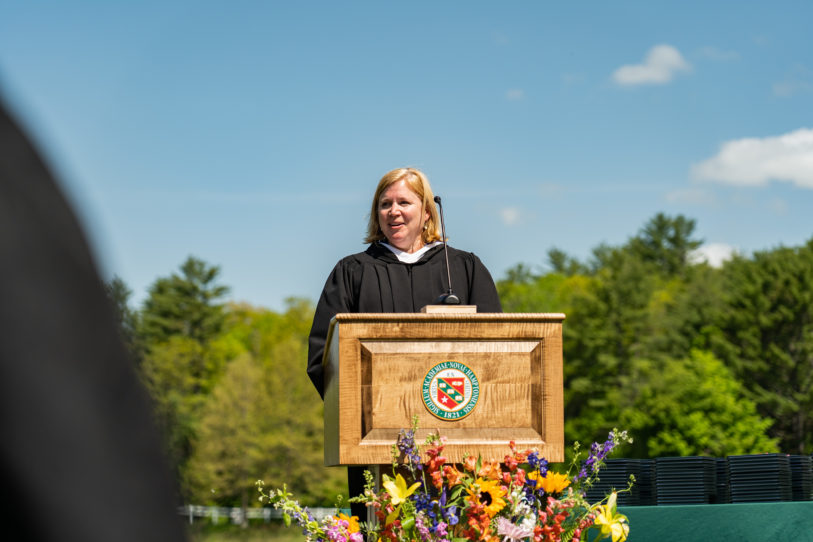This year’s Bicentennial Commencement ended mere moments ago for the class of 2021. On Saturday, May 15, 2021 they joined the ranks with thousands of alumni in pursuit of new adventures. Whether their footsteps lead them to further their education, explore a world of service, seek independent opportunities, build a network, and/or grow a family, the knowledge they’ve gained here will serve them well. With 199 years of commencements preceding this moment, there are many voices to look back on and continue to learn from—even now. Former leaders and familiar names linger on these pages, their wisdom not so outdated as some might believe.
It is interesting to leaf through past programs and speeches, finding differences and commonalities. For many years, the School announced the schedule of commencement day (and the days leading up to it) a full year early in Hamptonia in order for people to make time to prepare. The seventy-fifth anniversary saw a change in the evening lecture, held the night before graduation—instead of the typical talk, each of the literary societies would hold a half-hour address by alumni. Following graduation, the afternoon saw a meeting of the Alumni Association, with ten-minute orations by alumni, and the evening saw further performances of speakers and poetry. The following day witnessed the dedication of the Gordon-Nash Library with an address by Edwin C. Lewis, Esq. (the chairman of the building committee) and a poetry reading by Mrs. Nash; and the day ended with Reunion welcoming “all teachers and students who have been ever connected with the Institution” and a Promenade concert in the evening.
As we move into the early 1900s, we see a familiar format emerging for Commencement. Speakers, trumpets, singers, medals, diplomas, “New Hampton, Fair New Hampton”, and a recessional. Last year marked an exceptional year wherein the ceremony was hosted virtually, the campus empty of students and faculty during the early days of the pandemic. This year, while we have known the date of this bicentennial commencement for at least a year, if not longer, the pandemic did leave us wondering how it would take place, and what would be possible. Now that the Bicentennial Commencement ceremony is over, we look back at these few moments in the school’s history to remember the advice and support of those who came before us.
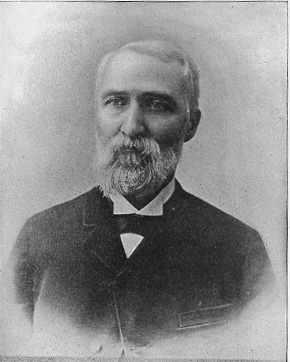
1873: Speaker, Atwood Bond Meservey, Professor and Principal
(Excerpt)
Ladies and Gentlemen of the Senior Class— Sadly joyful, the child leaves his home to seek his own fortune. Anxiously hopeful, the father bestows his final blessing. You are our children, waiting the parting benediction which is to break your connection with this Institution. Then let me say to you these four things.
1. Go Forth with open eyes.
Behind you is the history of men, nations, principles, sciences, systems, civilizations, religions. Beneath your feet are lost opportunities, ruined prospects, buried hopes. On either hand are wrecks of reputation, character, honor. Before you is the unborn future in all its purity. Above you is the great loving Father. With open eyes, therefore, search this broad domain, and from the failures and successes of others, learn lessons of wisdom, humility, faith.
2. Go forth with open ears.
Suffering humanity calls for aid. Degraded humanity calls for assistance. Oppressed humanity calls for deliverance. Ignorant humanity calls for education. Superstitious humanity calls for pure religion. Let your ears be open to all these calls. Listen not to the voice of slander, flattery, falsehood, but have ears open for the reception of truth, whether it comes in the silent whisper or in the voice of thunder.
3. Go forth with open hands.
There are burdens to be borne. Let your hands be open to receive your proportion. There are labors to be done. Let your hands be open to do your part. There are sacrifices to be made. Let your hands be open to bestow upon the deserving, to raise the responding, to avenge the innocent. In short, let your hands be open to every good work. Serve others first; yourself last.
4. Go forth with open hearts.
The world is full of head work. There is enough brain work. The great demand is heart work. Humanity is hungering, famishing, perishing, dying, for encouragement, sympathy, friendship, love. Reason, login, intellect alone can never reform the world. Heart must touch heart, in order to heal the wounds which sin has made. Then, if you would do a work worthy of yourselves, go forth to life’s duties with open hearts. Remember that heart work is life’s work. Remember these four things: go forth with open eyes, open ears, open hands, open hearts.
1949: Welcoming Address by Bill Gall ’49
(Excerpt)
Each one of us who will receive a diploma here this morning has realized an education that will help prepare him for a more complete life. The basic tools of learning — reading, writing, and arithmetic have been mastered while our proficiency in the use of the mother language has been increased. We have developed our understandings and apprecations, widened our interests, and developed high ideals which will afford relaxation from customary routine. We may never have occasion to use the knowledge of chemistry and physics that we have acquired but this is of little importance if we have gained from these studies the powers of observation which are infinitely valuable and the habit of applying scientific viewpoints to all subjects of discussion. […] We all realize that this is only the beginning of the hard work which lies ahead in college and in life. We know that the road to success will be barred by many obstacles but we will always do our best to overcome them. We will analyze the problems that confront us and solve them to the best of our ability. If we can succeed in this, we will at least partially repay those who have taken interest in us, and those who have so unselfishly sacrificed to provide this opportunity for us.
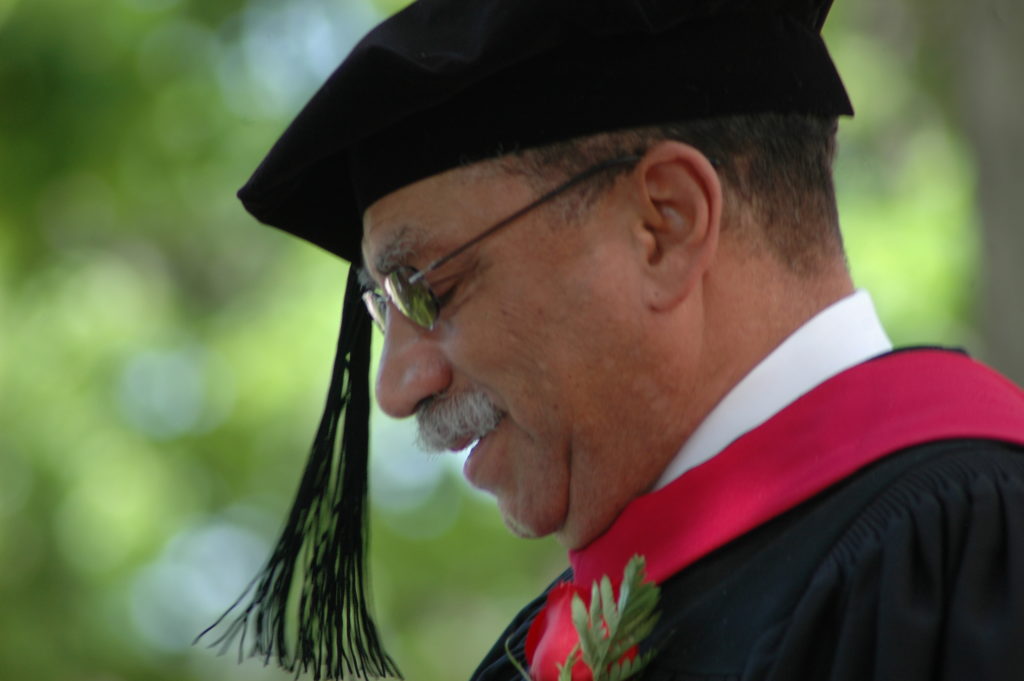
2009: Speaker, The Honorable Alford Dempsey ’65, Trustee
(Excerpt)
I find it fitting that the commencement theme this year is acceptance. Acceptance is just what I found here when I started my journey at New Hampton in 1961. As a kid that grew up in the segregated south, it was normal for there to be “whites only” and “colored” water fountains, restrooms, and waiting rooms. When I was six years old, my family moved into the home my parents built, which was pleasantly located right next door to a public park. However, the park was “whites only.” So, you can see how being accepted at New Hampton for who I was and what I had to offer, without regard to my race, was an uplifting experience. New Hampton was way ahead of the rest of the country, especially the part I came from. By accepting me and judging me on my performance- not my color- New Hampton provided me my first opportunity to partake of what I had been taught since birth; race, creed, or color did not make me any better or worse than any other human being.
Was New Hampton completely free of all discrimination? No, it wasn’t. I specifically remember a fellow who hailed from Mississippi, who proudly displayed the stars and bars Confederate battle flag on his wall. On balance, though, the atmosphere here was overwhelmingly accepting, nurturing, and affirming. As you can imagine, this environment had a profoundly positive effect on me and I directly correlate my experiences here at New Hampton with my successes later in life. By the same token, my presence among fellow students, faculty, and staff was living proof to them that the lie that African-Americans were in any way inferior was just that. Early on my fellow students showed that they respected my thoughts and ideas by electing me to the student council in my sophomore year. The faculty, among other things, selected me to be a proctor. In the final analysis, there could be no doubt that my acceptance by New Hampton was complete, when 44 years ago, I was awarded her highest honor to a graduating senior, the Meservey Medal for study, sport, and spirit.
New Hampton was a springboard for my subsequent life challenges. Most importantly, New Hampton taught me to read, write, and think critically. I was especially well prepared to take on the academic rigors of college life. And now, New Hampton has prepared you to meet whatever challenges you may face as you leave here to go off to college or on to other pursuits. I want you to know that even though times seem tough out there right now, there is always renewal, there is always hope. There’s a great big world out there with wonderful opportunities and challenges waiting for you. Little did I realize when I was here what doors would open up to me.
So, as someone who has faced adversity in his life and who has made every effort to better himself and the world around him, I would like to share some advice with you in preparation for the challenges you will face as you inherit this world.
First, whatever your goals may be, reach for the stars. Never limit yourself. Keep in mind the words of Dr. Benjamin Elijah Mays, the late president emeritus of my alma mater, Morehouse College: “It must be borne in mind that the tragedy of life does not lie in not reaching your goal. The tragedy of life lies in having no goal to reach. It isn’t a calamity to die with dreams unfilled, but it is a calamity not to dream. It is not a disgrace to not reach the stars, but it is a disgrace to have no stars to reach for. Not failure, but low aim is sin.”
Second, always strive to do your best. Probably the best one-liner I have ever heard about the slippery slope of giving anything but your best effort was from my son’s high school football coach, Larry Kroswick. One day after an especially lackluster practice, Coach Kroswick was rebuking the team for just going through the motions. He drove the point home with these unforgettable words: “if you take one lick from the lollipop of mediocrity, you’ll suck for the rest of your life.” Mediocrity is a strong narcotic best left alone. Remember: more times than not, you can obtain anything you are willing to put in the time and effort to achieve.
Third, how hard you try is more a measure of your character than any outward sign of success. Edgar A. Guest, in his poem, myself, puts it best:
I have to live with myself, and so,
I want to be fit for myself to know;
I want to be able as days go by,
Always to look myself straight in the eye;
I don’t want to stand with the setting sun
And hate myself for the things I’ve done.For me and I strongly suspect for you, New Hampton reinforced and built upon the core values I had learned at home: the value of a strong work ethic, the importance of taking responsibility for your actions, honesty, integrity, truthfulness, that is, not just refraining from lying, but partaking in candor and speaking your mind when the opportunity arises. I urge you to come back to these tools and rely on them as you go forth on your path.
Fourth, growth comes only when you step outside your comfort zone. There is a tension, an anxiety, associated with trying something new, venturing into unchartered waters, not knowing what you may encounter, not knowing whether you will succeed or fail. But I tell you, where there is no risk, no challenge, there is also no growth, no gain. If you stay safely within your comfort zone, you will never feel anxious, but you will never feel excitement either. If you stick with the “same old same old,” I promise you, you will soon be bored to tears, living a dull and ordinary life.
Great athletes, surgeons, actors, and trial lawyers, all understand this tension. But they use it to propel themselves to a higher level of performance. Don’t let the anxiety, the fear of failing hold you back. Learn to embrace that fear and make it work for you.
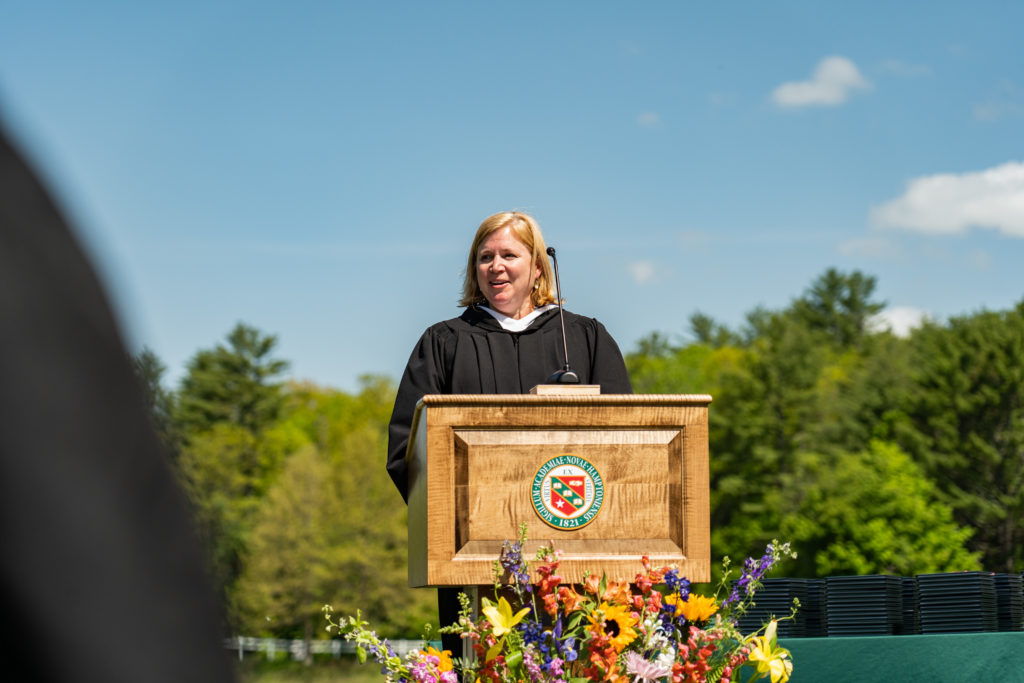
2019: Speaker, Jennifer S. Berry ’83, P’07, ’10, ’15, H’19
Good fortune is not grounded in luck; instead, it is the culmination of experiences, varied and vast, that define fortune. As a lover of the English language, I have a fascination with linguistics. Fortunate is an extension of fortune, and fortune is often described in monetary terms; yet as a teacher, I define fortune differently. My dad, a 1959 graduate of New Hampton School, used to say, “every day you get better or worse you never stay the same.” As a lifelong teacher and coach, these words still ring true to me today. I hope I do not waste a day getting worse because I have not chosen to better myself in at least one way. I am fortunate to live with this mindset. I have been fortunate to learn, teach, and grow with New Hampton School as my community and this has allowed me to improve myself each day.
Fortunate experiences are not always positive. My first overnight on campus occurred when I was eight; one of my friends was a faculty child and I was invited for a sleepover; it was on this night when I broke my first rule. We snuck out of Pillars after bedtime…right over there… this used to be one long building…the front building was attached to the health center, and this was a dorm…wow has the campus improved, anyway, we snuck out of the faculty apartment through the dorm to attend the Saturday night movie in the basement of Meservey. Poor choice, not because we were caught but rather because the film was a horror movie titled “The Night of the Living Dead”. Decisions have consequences. Did I get better that day; yes…although painful, I learned something about myself…fear and guilt are difficult emotions to reconcile without an adult as an 8 year-old. I never told a soul about this mistake…until right now.
So yes, we all make poor choices at one time or another, but the outcomes are fortunate, because we learn from them. In fact, the ability to be nimble—flexible in body, thought, and situation—serves us all well in this fast paced, technologically driven world. I believe this flexibility is a unique outcome of my New Hampton School education—I hope this becomes true of yours as well. Ultimately, we learn best through experience.
As an English teacher, my favorite writers were the transcendentalists. Emerson, Thoreau, Alcott, and Fuller believed education should be grounded in experiences and relationships…the linking of ideas yields unique and novel thought. John Dewey, an educational philosopher I studied in college, reinforced these ideas by coining “experiential education” as a teaching method; rote learning should be merely a part of education…not education in its entirety. When you learn by doing, you internalize learning, problem solve, think critically, and arrive at original thought. I know you have experienced this type of learning at New Hampton School. Alec Grace, Devon Garrett, Maryellen Leach and those students in my AP English Language and Composition class this spring…as the final English students at New Hampton School I have taught, I hope there is at least one idea or skill you will carry with you and now see as original thought or daily practice. It may be removing the four-letter word “THAT” from your writing.
It seems fitting to leave you with a quick English lesson, on this day, my last formal day as a teacher at New Hampton School:
Ralph Waldo Emerson, my favorite of the transcendentalists, defined success through poetic verse and these words I have had on my desk or tack board since I started teaching; I try to live by these as a teacher and perpetual student.
He begins:
To laugh often and much…
laughter makes every situation better, whether a slip on the ice in February while traveling the path from the ARC to Lane or observing a silly “minute to win it” game during school meeting…we are all better as a result of laughter. A good belly-laugh and maybe even a snort makes life full.
Emerson continues:
To win the respect of intelligent people and the affection of children…
From this, I have learned using big words does not make me intelligent, thinking big thoughts with an open mind does. Children see the world through innocent eyes and therefore are open-minded and eager to take risks…It seems to me those who are most intelligent approach ideas with this childlike innocence…I admire many of you for this, but especially students like Jun Cha who ate gummy worms like a small child while discussing big ideas he wanted to share in his college essays. Or Jalen Wand who wears his slippers every day, because they are comfortable.
Emerson then says….
To earn the appreciation of critics and endure the betrayal of false friends….
What does this mean? Agree to disagree but listen well; listen, then, take a deep breath before responding, your thoughts might change if you take a minute to listen. This takes work and practice…thank you to those who allowed me to repeatedly critique your college essays without fear or negativity. Thank you, too, for listening as I speak to you today.
Emerson asks us to appreciate beauty…
New Hampton’s campus might seem small, rural, and uninspiring, yet, I guarantee when you return for a reunion, you will then see the beauty of this place where you were able to learn and grow. I have been fortunate to travel extensively, and this place…right here…is one of the most beautiful places I have ever been. I challenge you to return and see if you share my perspective.
I also appreciate the beauty in the art of Harry Shen, Tina Zhou, Will Rowan, Emily White and Christopher Fridlington; their work leaves me speechless and evokes strong emotion. So, too, does the beauty of this setting and the work created by students here.
Emerson continues with “ to find the best in others…
In the college counseling world, I get to discover the unique talents and experiences of each student then write about each of your exceptional gifts…this is why I love my work, and why it will be so hard to leave it. Do you know Jameson Goff and Kristina Dietrich are two of your classmates who perpetually appreciate and look for the best in others? I know they are not alone, but getting to know them this year has confirmed for me the goodness of you…the next generation. Your teachers at New Hampton School try to bring out the best in you as well…their singular goal is to help you learn and grow. It is fitting that I recognize my colleagues’ work; not only have I been surrounded by outstanding students but also committed, intelligent and caring peer educators. I will miss all of you as well.
Emerson ends by saying…To leave the world a bit better, whether by a healthy child, a garden patch or a redeemed social condition; to know even one life has breathed easier because you have lived. That is to have succeeded.
I have lived such a full, successful, and fortunate professional life through Emerson’s instruction. You have all made my world a better place through your contributions.
Live a fortunate life, appreciate beauty, find the best in others, and each day, get better…not worse. I have a fortune cookie for each of you…perhaps the quote inside will prove to be your words to live by…if not, enjoy the cookie!

2020: Cum Laude Speaker, Xinying Sally Wang ’20
(Excerpt)
My teachers ignited my interests in various subjects, and my peers have shown me how to be a leader as well as what ‘diverse’ and ‘inclusive’ mean. I have become a better person, a person who is more open-minded and capable of taking on responsibilities, and who is much more mature and confident when encountering challenges and failures, yet I recognize I still need to improve.
I want to give one piece of advice: try new things and embrace new challenges. I never thought I could be a student leader, but I became one; I never thought I would be able to deliver a speech during my graduation, but I am giving one. […]
I am fortunate that I have been able to meet so many people who are outstanding and truly caring for one another, who patiently helped me to grow from a timid and quiet international student to who I am now.
The pandemic of COVID-19 is an unique experience for our class, and we are learning to be resilient and strong because of it. Even though the future is uncertain, our community has prepared us well to face the challenge and continue to develop under the pressure. I believe every member of the class of 2020 will all grow to be the best versions of themselves and will walk into a bright future.
